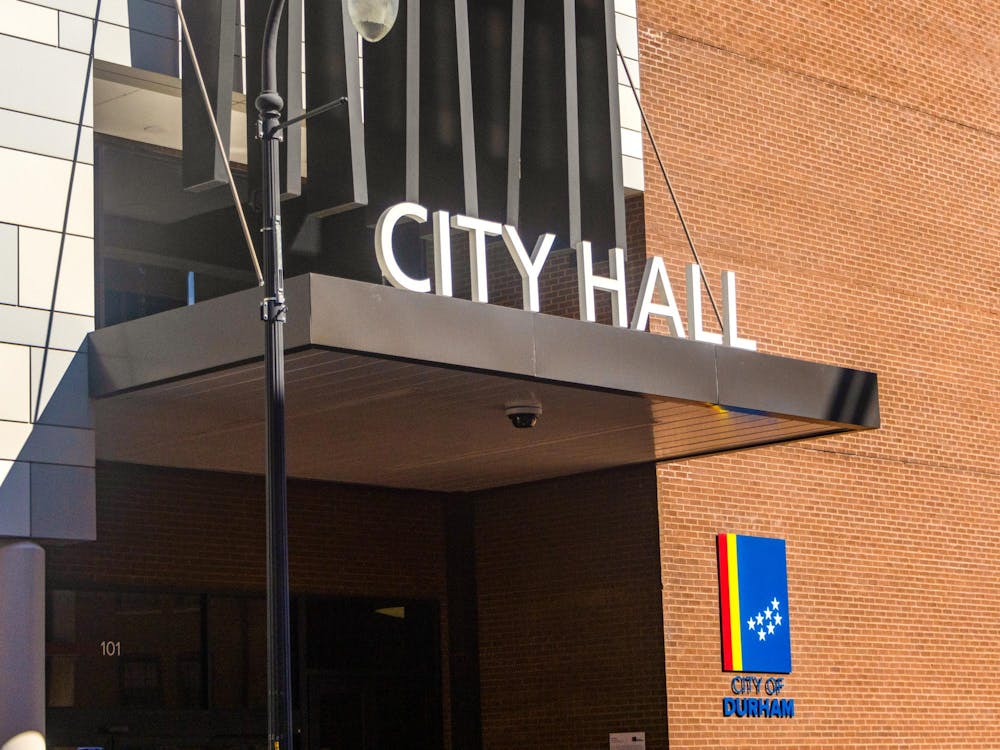Durham City Council appointed a new city manager, made a proclamation in honor of the Civil Rights anthem “A Change is Gonna Come,” certified the results of the city’s 2024 bond referendum and approved several amendments and contracts during its Monday meeting.
New city manager
City Manager Wanda Page announced in July that she would be stepping down at the end of the year after 36 years of service to the city in various positions. In her notice to the council, she expressed her belief that “now is the right moment to begin the transition of passing the torch to new leadership and allow fresh perspectives to shape the future of our beloved city.”
The council voted Monday to appoint Deputy City Manager Bo Ferguson, who has been in the role since 2013, to be her successor. The motion passed with no opposing votes, though three council members abstained.
Ferguson will assume the position Jan. 1.
During the Monday meeting, Mayor Leonardo Williams issued a proclamation commemorating Page’s retirement, which he noted was “the happiest and hardest proclamation [he’s] ever read.”
“There is no one more fitting that can receive the words [of this proclamation], which symbolizes the highest honor possible that can be received from the City of Durham,” Williams said. “… This woman [is] amazing, and I don’t think folks will ever fully appreciate how well she’s run this city.”
Page was given a key to the city, and the council also showed a short video of moments throughout her career in honor of the impact she has had on the city and its residents.
Civil Rights proclamation
At the outset of the meeting, the council issued a proclamation honoring the life of singer-songwriter Sam Cooke. Cooke, who is often referred to as the “King of Soul,” is best known for his song “A Change is Gonna Come,” which Mayor Pro Tempore Mark-Anthony Middleton noted was first written in Durham in May 1963.
Cooke was inspired to write the song after speaking with students from North Carolina Central University who had participated in a sit-in at a local restaurant to protest segregation. He wrote the song on a bus and Durham that day and recorded it the next year, after which it became an anthem for the Civil Rights Movement.
In 2006, the song was inducted by the Library of Congress into the National Recording Registry, cementing its place among the most “culturally, historically or aesthetically significant” music in American history. It was named the third-greatest song of all time by the Rolling Stone this year.
“Durham inspires great art,” Middleton said. “Now tonight, I am so proud and honored to read a proclamation on behalf of my fellow colleagues and the City of Durham to honor the life of Sam Cooke and to honor the iconic place of this song … in American musicology, and particularly in this pantheon of the Civil Rights Movement.”
Last Wednesday marked the 60-year anniversary of Cooke’s death.
Within the proclamation, the City of Durham also expressed gratitude toward NCCU students and their supporters “who, in the face of significant risk, courageously staged demonstrations in 1963 which ultimately led to the emergence of a more just and equitable city.”
In other business
The council unanimously passed a number of appointments and amendments, many of which appropriated funds or approved contracts for the new year. The renaming of Vivian Street to William V Bill Bell Way was also approved in honor of the city’s longest-serving mayor.
Additionally, the council unanimously certified the results of the city’s special bond referendum, which asked voters in November whether the city should borrow $200 million to support a number of local infrastructure improvements, including parks and sidewalk upgrades and construction of a new aquatic center.
The referendum received overwhelming support from voters, though multiple residents cautioned the council during the Monday meeting to be mindful of developing in a sustainable way that does not contribute to Durham’s affordable housing problem.
During the announcements period, Councilmember Chelsea Cook spoke out against the North Carolina General Assembly’s recent override of Gov. Roy Cooper’s veto of Senate Bill 382, which sent the controversial legislation into effect last week.
Get The Chronicle straight to your inbox
Sign up for our weekly newsletter. Cancel at any time.
“Just days before many of their terms were set to end, having been not [re]elected to their seats, they used the guise of hurricane relief to strip power — both from local governments and from individual voters,” she said. “… Of course, we don’t have power to influence the state as your local government, but those things impact us, and also they impact our residents, and so they are very important.”
She was joined in her condemnation of the NCGA’s move by Councilmember Nate Baker, who referred to the legislation as “the sham Hurricane Helene bill.”

Zoe Kolenovsky is a Trinity junior and news editor of The Chronicle's 120th volume.

